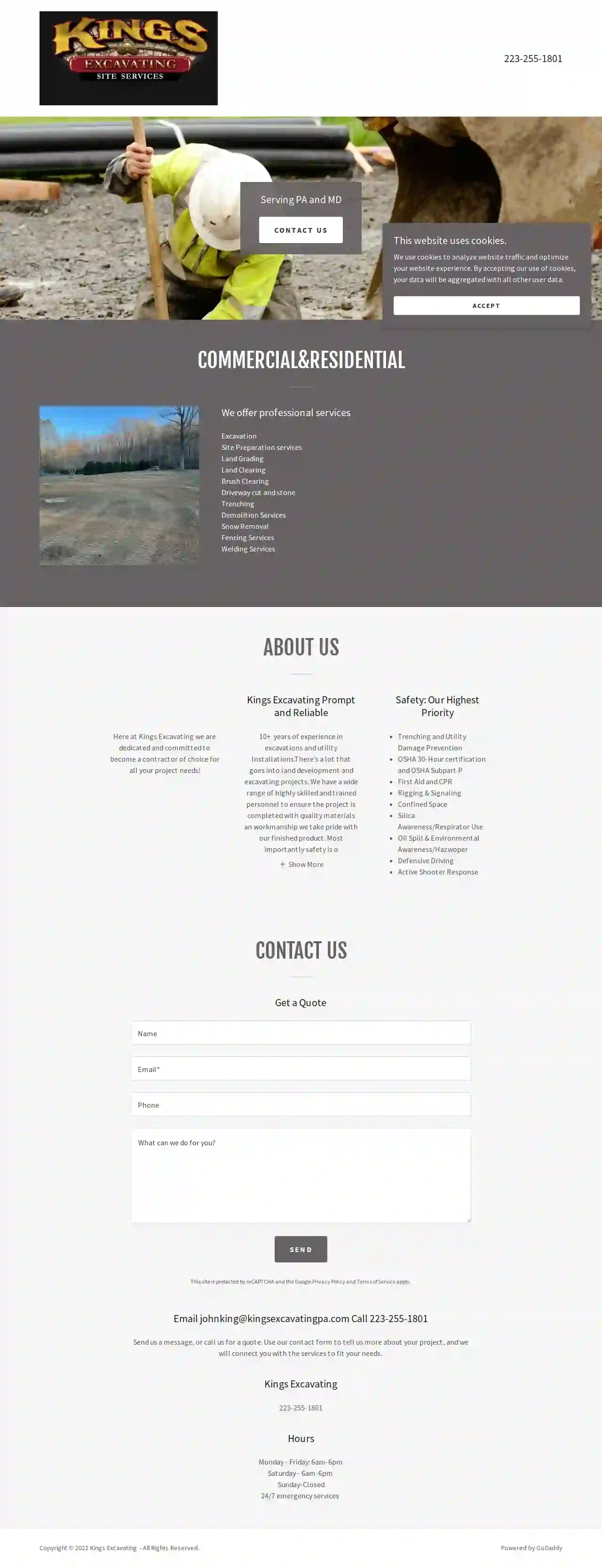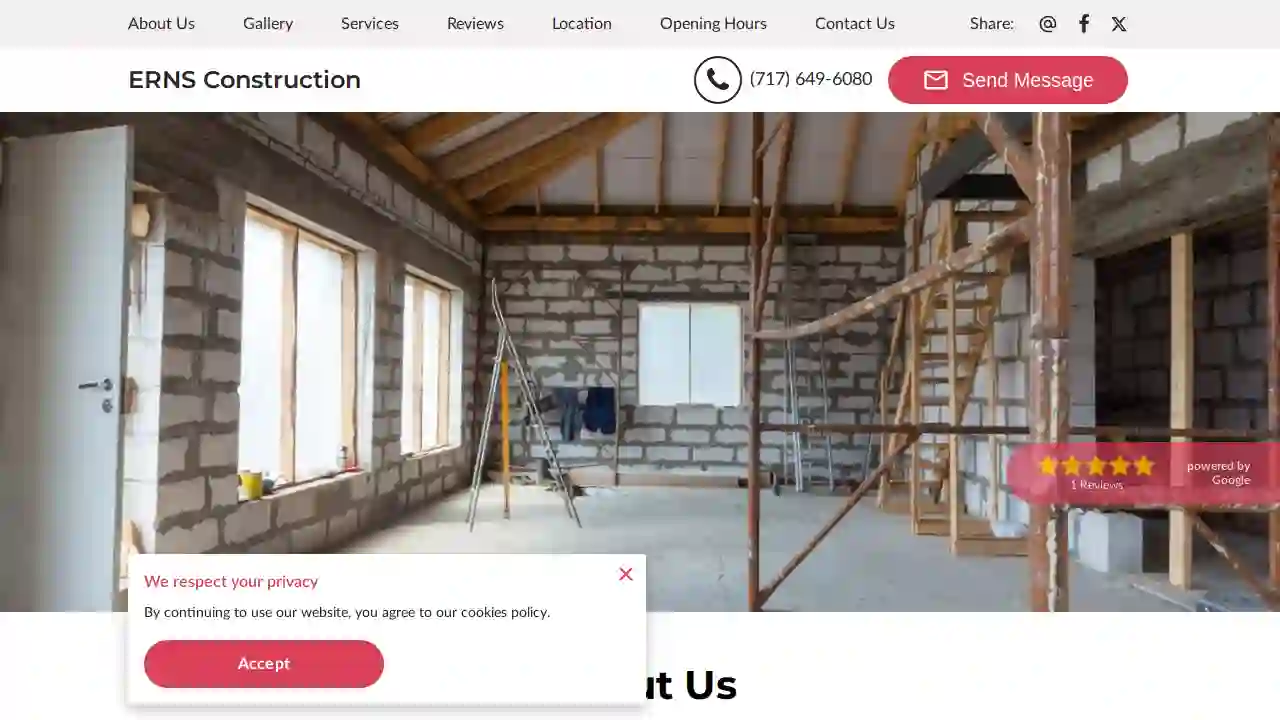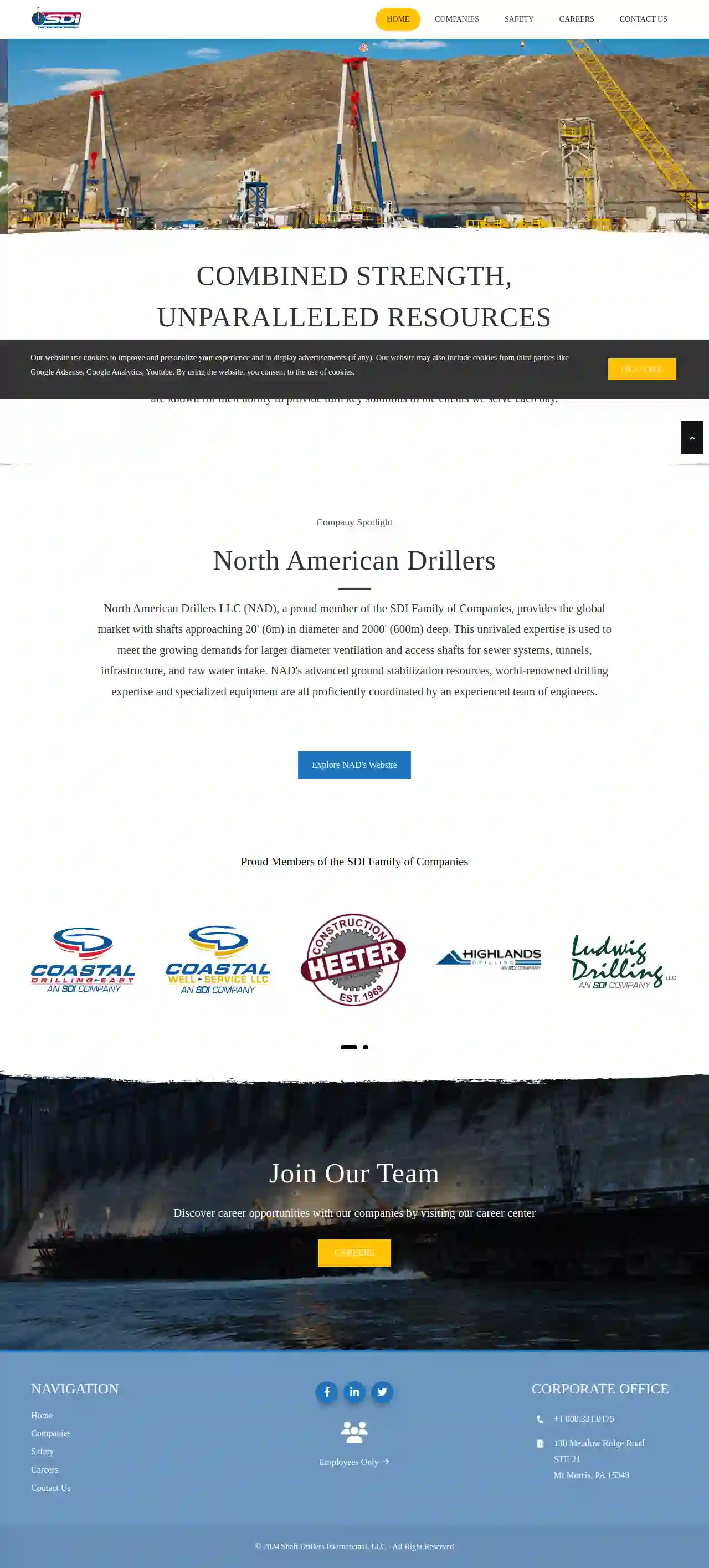Demolition Contractors Upper St. Clair
Find top Demolition Company Near Me in Upper St. Clair
Receive up to 3 Demolition Services quotes for your project today! Compare profiles, reviews, accreditations, portfolio, etc... and choose the best deal.

Kuharchik Construction
4.428 reviews420 Schooley Ave, Exeter, 18643, USWE ARE KUHARCHIK CONSTRUCTION. Providing superior electrical contracting services throughout Pennsylvania since 1973. We’re local, we’re family owned, we’re union! Kuharchik is your first choice in Electrical Contracting. From Highway Signing & Lighting to Foundation Installation, we take pride in every job that we do.
- Services
- Why Us?
- Gallery
Get Quote
ES Excavation
56 reviewsESExcavation.com, Newtown Square, Pennsylvania, 19073, USExcavation Contractors serving Southeast PA If you are a residential or commercial customer in Southeast PA and the surrounding region, ES Excavation is here to help anytime you need someone to dig in the dirt. We are a full-service excavating contractor, and can also provide you with landscape design and storm water solutions. We aim to complete each of our projects in an efficient and cost-effective way. We don’t cut corners and we always take proper precautions to prevent any potential problems and dangers while striving to ensure that the project is complete on time and under budget. We take the time to meet with all of our clients to ensure that every project is completed to their standards. Providing us with your vision, goals and timeline allows us to do our job even better. Every client we meet and do business with is satisfied with our work. That’s because we work with you, and have a genuine interest in achieving your project goals.
- Services
- Why Us?
- Gallery
Get Quote
Rutledge Excavating Inc.
3.56 reviews2496 Hancock Highway, Equinunk, 18417, USWELCOME RUTLEDGE EXCAVATING INC. We’re thrilled to invite you to explore our website, where you’ll discover a showcase of our completed projects, an employment hub, and a convenient platform to submit your project for bid. As a local, family-owned company deeply rooted in Northeast PA, Rutledge Excavating prides itself on delivering top-notch full site development services tailored to meet your needs. Our completed project pages offer a glimpse into our commitment to excellence and craftsmanship, showcasing our dedication to every job we undertake. OUR SERVICES View More Land Clearing Demolition Concrete Design / Build Erosion & Sediment Control Storm Water Management Detention Basins Earth Work Water, Sewer, Electric, Gas Utilities Underground Piercing (Trenchless Boring) Roads, Driveways, Parking Lots Ponds Pump Stations (Water & Sewer) Sports Complexes REQUEST A BID For those ready to kickstart their next project, our bid submission page ensures a streamlined process, putting your vision in motion with ease. MORE INFO CAREERS If you're looking to join a dynamic team passionate about what they do, our employment page is the place to be. We're always on the lookout for skilled individuals who share our values and drive for success. MORE INFO
- Services
- Why Us?
- Gallery
Get Quote
CAG Construction Corp.
30 Summit Ave., Staten Island, 10306, USCAG Construction: Your Trusted Partner for Concrete Construction and Site Work CAG Construction is a family-run business established in 2007, specializing in all phases of concrete construction and site work. We are committed to delivering projects within budget, on time, and with the utmost professionalism. Our team has the experience and expertise to work seamlessly with project managers and design teams, ensuring a smooth construction process. Our Commitment to Excellence Edward Gonzalez, our founder, is a graduate of the NYC Small Business Services Construction Mentorship Program, NYC SBS Bond Readiness Program, and the New York City Economic Development Corporation – Construct NYC Program. This comprehensive training has equipped us with the knowledge and skills to deliver exceptional results. Certifications and Accreditations We are proud to be a New York City MBE Certified company, demonstrating our commitment to diversity and inclusion. We are also SCA Approved and a member of the National Association of Minority Contractors (NAMC), further solidifying our dedication to industry standards and ethical practices.
- Services
- Why Us?
- Gallery
Get Quote
Strouse Excavating and Landscaping
56 reviewsHarrisburg, USRF Strouse Landscape Excavate: Your Trusted Partner for Excavation, Landscaping, and Winter Services in Mount Wolf, PA We pride ourselves on providing exceptional services to residential and commercial clients throughout Mount Wolf, PA. With a commitment to quality, safety, and customer satisfaction, we offer a comprehensive range of services to meet all your property maintenance and improvement needs. From expert excavation to stunning landscape design and reliable winter services, we are your go-to solution for transforming and maintaining your outdoor spaces.
- Services
- Why Us?
- Gallery
Get Quote
Shiloh Paving & Excavating, Inc.
3.77 reviews300 Cloverleaf Road, York, 17406, USShiloh Paving and Excavating: Your Trusted Partner for Quality Paving in York County, PA Shiloh Paving and Excavating has been serving the York County community since 1957. We are a family-owned and operated business with a commitment to providing exceptional service and exceeding customer expectations. Our team of experienced professionals is dedicated to delivering high-quality paving solutions for a wide range of projects, from residential driveways to commercial parking lots. We understand that your project is unique, and we take a personalized approach to ensure that your needs are met. We work closely with you throughout the entire process, from initial consultation to project completion, to ensure your satisfaction. At Shiloh Paving, we believe in building lasting relationships with our clients. We are committed to providing transparent pricing, timely completion, and exceptional customer service. We are proud to be a trusted partner for all your paving needs. Our Mission Statement "Whatever it Takes" We do "Whatever it Takes" through our team approach to provide excellent service and an outstanding customer experience.
- Services
- Why Us?
- Testimonials
- Gallery
Get Quote
Kings Excavating
Pittsburgh, USKings Excavating: Prompt and Reliable Here at Kings Excavating, we are dedicated and committed to becoming your contractor of choice for all your project needs! With over 10 years of experience in excavations and utility installations, we have a wide range of highly skilled and trained personnel to ensure your project is completed with quality materials and workmanship. We take pride in our finished product, and most importantly, safety is our number one priority. We strive to create a safe working environment for our employees and the public throughout every project. Safety: Our Highest Priority We prioritize safety in all our operations, adhering to the highest industry standards. Our team is equipped with the necessary certifications and training to ensure a safe and efficient work environment. Our commitment to safety includes: Trenching and Utility Damage Prevention OSHA 30-Hour certification and OSHA Subpart P First Aid and CPR Rigging & Signaling Confined Space Silica Awareness/Respirator Use Oil Spill & Environmental Awareness/Hazwoper Defensive Driving Active Shooter Response
- Services
- Why Us?
- Gallery
Get Quote
Weaver & Sons Excavation
55 reviews5147 Ore Bank Road East, York, 17406, USThe clear choice for all your excavation needs. These are our original pieces of equipment. While we have greatly expanded our fleet to address our clients' needs, our motto is still the same: "We want the small jobs the big guys don't want." SERVICES With over 30 years of experience in excavation and general construction, we can help you design a solution that meets your needs at a very reasonable cost. ABOUT Weaver and Sons Excavation started in 2007 when Mark Weaver closed his general construction business after 20 years. He decided to keep his excavation equipment and continue on as a part-time business. Eventually, business was good enough that he decided to go full-time. After going full-time, the Weaver and Sons office was relocated to a 200-year-old town hall building in Wrightsville that Mark personally renovated. We have since added a new shop and office in Hellam, York County. Mark's experience of over 30+ in the general construction business gives him the unique ability to advise on all phases of your project, as well as the excavation phase. Weaver and Sons can provide references from past residential clients, as well as numerous commercial contractors that use them regularly. Our mission is simple: Get in, get out, and leave a happy customer!
- Services
- Why Us?
- Our Team
- Gallery
Get Quote
ERNS Construction
51 reviews1005 S. 16Th St., Harrisburg, 17104, USAbout Us Here at ERNS Construction we offer an exceptional range of construction services in the greater Harrisburg area. From concrete foundation work to excavation, brickwork, and architectural advice, our experienced builders understand the best solutions that work for you. We’re all dedicated to our roles and work hard to get the job done. Give us a call at +17176496080 so we can discuss any of your construction needs. Expert Services Offering a complete range of services, we pride ourselves on delivering projects on time and to budget. Our skills also mean we can create custom carpentry and joinery solutions to meet your needs. So, whether you’re looking to extend, restore, or renovate, our team has the vision and experience to find a resolution to suit your budget and timescale. Contact us to see how we can help. Our Timetable Is Flexible Our painters and decorators are highly professional and work with the clients’ best interests at heart. That’s why we adapt our schedules to yours, and not the other way round. As one of the best painter and decorator services in Harrisburg, we offer tailored solutions to ensure customer satisfaction. All our internal and external jobs are carried out in this way, so rest assured we can fulfil all your painting and decorating needs.
- Services
- Why Us?
- Testimonials
- Gallery
Get Quote
Shaft Drillers International
4.115 reviews130 Meadow Ridge Road STE 21, Mt Morris, 15349, USCOMBINED STRENGTH, UNPARALLELED RESOURCES The SDI Family of Companies provides the global market with the very best technological innovations and specialized construction solutions. Built on the principles of hard work, integrity and honesty, SDI companies are known for their ability to provide turn key solutions to the clients we serve each day.
- Services
- Why Us?
- Gallery
Get Quote
Over 22,076+ Excavation Contractors on our platform
Our excavation pros operate in Upper St. Clair and beyond!
ExcavationHQ has curated and vetted Top Excavation Businesses in and around Upper St. Clair. Find a trustworthy contractor today.
Frequently Asked Questions About Demolition Contractors
- Implosion: Using explosives to collapse a structure inwards rapidly. Suitable for large buildings in open areas.
- Wrecking Ball: Swinging a large steel ball to impact and break down the structure. Effective for bringing down walls and other solid elements.
- High-Reach Demolition: Utilizing specialized excavators with extended arms and demolition attachments for dismantling tall structures piece by piece.
- Selective Demolition: Removing specific parts of a building while preserving other sections. Often used in renovation projects.
- Deconstruction: Carefully dismantling a building to salvage reusable materials, reducing waste and environmental impact.
- Waste Generation: Demolition generates a large volume of debris, contributing to landfill space and potentially releasing harmful substances into the environment if not disposed of properly.
- Air Pollution: Dust and particulate matter released during demolition can impact air quality, affecting human health and the environment.
- Noise Pollution: Demolition activities can generate significant noise, disturbing nearby residents and wildlife.
- Resource Depletion: Demolition consumes resources that could be salvaged and reused, contributing to resource depletion and environmental degradation.
- Experience: Look for companies with a proven track record and years of experience in the demolition industry.
- Licensing and Insurance: Ensure the contractor is properly licensed to operate in your area and carries adequate insurance to protect you from liability.
- Safety Record: Inquire about their safety protocols and accident history. A reputable contractor prioritizes safety.
- References and Reviews: Ask for references from past clients and check online reviews to gauge their reputation and customer satisfaction.
- Professionalism: Choose a company that communicates clearly, provides detailed estimates, and has a courteous and responsive team.
What are the different types of demolition?
What is the difference between demolition and deconstruction?
Demolition: Typically involves bringing down a structure quickly and efficiently, often using heavy machinery and potentially explosives. The primary goal is to clear the site.
Deconstruction: Focuses on carefully dismantling a building piece by piece to salvage reusable materials. It prioritizes minimizing waste and environmental impact, often involving manual labor and specialized tools.
The choice between demolition and deconstruction depends on the project's objectives, budget, and environmental considerations.
What are the environmental impacts of demolition?
How do I find a reputable demolition contractor?
What are the different types of demolition?
- Implosion: Using explosives to collapse a structure inwards rapidly. Suitable for large buildings in open areas.
- Wrecking Ball: Swinging a large steel ball to impact and break down the structure. Effective for bringing down walls and other solid elements.
- High-Reach Demolition: Utilizing specialized excavators with extended arms and demolition attachments for dismantling tall structures piece by piece.
- Selective Demolition: Removing specific parts of a building while preserving other sections. Often used in renovation projects.
- Deconstruction: Carefully dismantling a building to salvage reusable materials, reducing waste and environmental impact.
What is the difference between demolition and deconstruction?
Demolition: Typically involves bringing down a structure quickly and efficiently, often using heavy machinery and potentially explosives. The primary goal is to clear the site.
Deconstruction: Focuses on carefully dismantling a building piece by piece to salvage reusable materials. It prioritizes minimizing waste and environmental impact, often involving manual labor and specialized tools.
The choice between demolition and deconstruction depends on the project's objectives, budget, and environmental considerations.
What are the environmental impacts of demolition?
- Waste Generation: Demolition generates a large volume of debris, contributing to landfill space and potentially releasing harmful substances into the environment if not disposed of properly.
- Air Pollution: Dust and particulate matter released during demolition can impact air quality, affecting human health and the environment.
- Noise Pollution: Demolition activities can generate significant noise, disturbing nearby residents and wildlife.
- Resource Depletion: Demolition consumes resources that could be salvaged and reused, contributing to resource depletion and environmental degradation.
How do I find a reputable demolition contractor?
- Experience: Look for companies with a proven track record and years of experience in the demolition industry.
- Licensing and Insurance: Ensure the contractor is properly licensed to operate in your area and carries adequate insurance to protect you from liability.
- Safety Record: Inquire about their safety protocols and accident history. A reputable contractor prioritizes safety.
- References and Reviews: Ask for references from past clients and check online reviews to gauge their reputation and customer satisfaction.
- Professionalism: Choose a company that communicates clearly, provides detailed estimates, and has a courteous and responsive team.